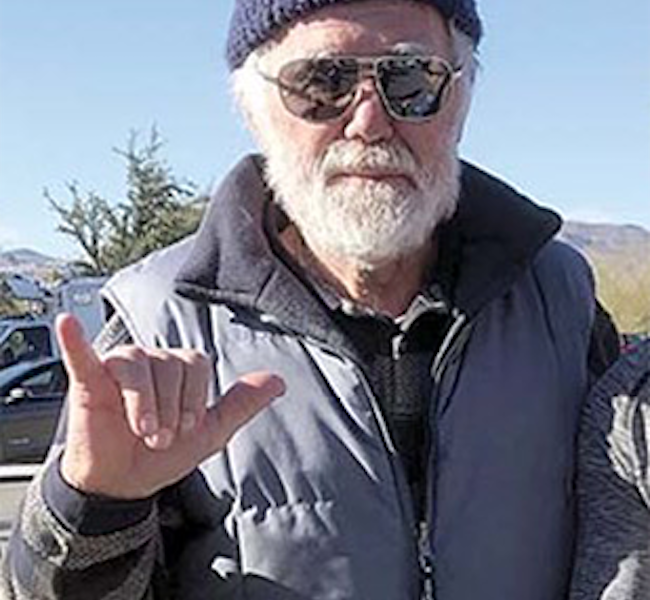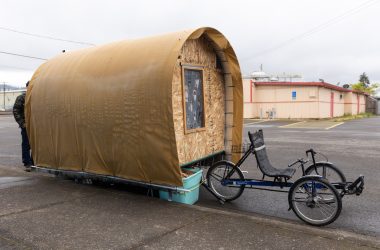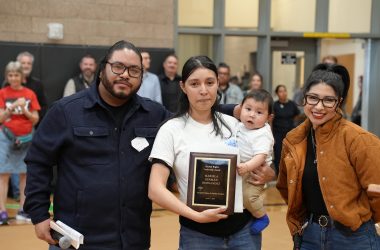
Johann Faerber, better known as Johnny, has a “tail” to tell that gives new meaning to the old runner’s complaint about “having to haul my ass across the finish line.” We’ll get to that “tail” in a little bit.
Johnny is a lifetime distance runner, marathon champion, and running coach and has been a track and field umpire for the past 15 years.
Johnny’s life reads like a sprawling novel. He was born in 1938 in Jimbolia, Romania, the same town where his mother was born in 1914. By a profound quirk of history she was born, not in Romania, but in Hungary, where Jimbolia sat before the massive realignment of national borders that followed the collapse of the Austro-Hungarian Empire in 2018.
As a young child, Johnny’s family moved to Germany. Following WWII, the family joined thousands of other homeless and displaced Germans who were resettled in the countryside outside of Dachau. Ultimately, they were relocated in the former concentration camp once it was cleared by the American occupying troops. His father worked as a machine shop foreman in the camp. Too young to fully understand what the camp had been used for during the war, Johnny said, “There were eerie parts to the camp and rumors that we would learn about later.”
In 1952, while Johnny was in high school, the Faerber family moved from Germany to Los Angeles where he focused on learning English “to become an American. I trailed after a friend who spoke English better than me, and after about a year I was fine.”
 Johnny, 1957, in the Pack Burro Race.
Johnny, 1957, in the Pack Burro Race.
He added that any issues he confronted in 1952 as a new kid with a German accent soon went away because of his athletic prowess, making him a welcome addition to the school’s sporting world.
Solidifying his Americanism, Johnny enlisted in the U.S. Army in 1958 and spent four years on active duty, followed by 32 years in the Army Reserve. Speaking about his desires back then, “I was gung-ho. They were taking senior officers to Vietnam as advisors in those days before the war escalated, and I wanted to go, but I didn’t have the rank.”
With a gifted physique and strong internal drive, Johnny started running marathons in 1964. He did not complete his first race, but by 1967 he ran a 3:36:42 at the Honolulu Marathon. Two years later he won the same race in 2:44:02, an astounding improvement that Johnny says came from serious training and “putting in the required miles.” In 1971 Johnny moved to Hawaii, where he became the running coach for the University of Hawaii “Wahines” (women’s team). In Hawaii, he continued to run and won the first Maui Marathon in 1971 in a slightly pedestrian time of 3:00:47. Johnny said, “I would have run faster but back then they started the race in the morning and it got so hot I had to stop and cool my body down by taking a shower.” Johnny would achieve a 2:36:47 personal best in the 1977 Honolulu Marathon.
In 1977, Johnny was surprised to be at the start of the New York City Marathon mixed in with elite contenders Frank Shorter (who won Olympic Gold in the marathon in Munich, 1972), Oregon’s Kenny Moore, and Bill Rodgers (four-time Boston Marathon winner and former American Marathon record-holder). While crossing the Brooklyn Bridge, around mile 15, he heard a bystander shout out, “Go Johnny, Go” then caught a glance of Frank Shorter, who had quit the race, cheering him on! Johnny would finish the race in 2:38:16, good for 125th place in the Johnny Faerber race won by Bill Rodgers.
As for hauling your ass across the finish line … Burro racing, popular in the desert areas of California, Arizona, Nevada, and Colorado, gives a runner the challenge of competing while tethered to a donkey selected by a random drawing before the race.
Johnny won Colorado’s famous Pack Burro Race in 1957, a two-day, 42-mile distance. Note that Johnny, who would soon thereafter enlist to become a U.S. Army Ranger and member of the Special Forces, had a daunting and chiseled physique while winning the race and carrying his animal to glory.
Other runners must have looked at Johnny sporting shorts and the less common running shoes of the other contestants in the race and known they had little chance to compete with that six pack! “I won $500 for winning; that was a lot of money in 1957.”
The whole race was part of a big weekend celebration that included parades, a beauty pageant, and festivities rounding out “The Greatest Donkey and Runner Race in the World.” And, in case you think any “ass” can win that race once, Johnny returned to win the race again in 1960 and 1966.
It was in another Burro Race in Beatty, Nevada, that Johnny literally had to carry his recalcitrant (that means stubborn!) equine “ass” across the finish line to beat out another charging competitor.
Johnny is soft-spoken but incisive when he speaks about runners and running. Johnny said he enjoyed running because it put him out in nature but his primary motivation was, and is, to win. “I’m competitive. I like to measure myself against others.” That competitive drive first expressed itself in swimming competitions in Dachau when he was just nine years old and continued until he stopped running six years ago at age 77. “My legs gave out.” Johnny said that to be a great runner, “You need a good body, a good mind, patience, inner drive, motivation, discipline, and a belief in yourself.”
Another anecdote about Johnny Faerber’s amazing life is a debt owed to him by none other than Oregon’s Steve Prefontaine. “I ran into Pre on a street in Eugene, and he needed some change for the parking meter so I gave him a dime,” Johnny said. He added, half-seriously, “Pre needs to come back so he can pay off the debt.”
Johnny lives with his wife Janet in Cottage Grove where his office and library house the mementos of a man who has literally run for his entire life. He has an impressive office filled with Native American art, personal mementos, and a vast reference library about running including books on training, performance, diet, and every possible nuance of how to run better. His scrapbooks are an exhaustive but well-earned collection of achievements, containing everything from the marathons to the exploits of Faerber’s Flyers.
The Flyers were started in 1980, when Connie Comiso of the University of Hawaii cross country team decided she wanted to keep running competitively after graduation. She asked Faerber to keep on coaching her and other women runners, and the club was born.
Today, Johnny can be seen with umpiring flags in hand at Hayward Field and any other place where talented track umpires are needed. Johnny is a dependable fixture as a member of the Hayward Field Umpires Crew and enjoys seeing athletes perform. Umpiring has many stories that go with it.
One Johnny shares is about the great Chinese hurdler, Liu Xing. “I raised the red flag on reigning Olympic Gold Medalist Liu Xing when he false-started during the Prefontaine Classic,” Johnny added, “I don’t think he wanted to run that race because he was injured but didn’t want to disappoint the crowd by not being there.”








